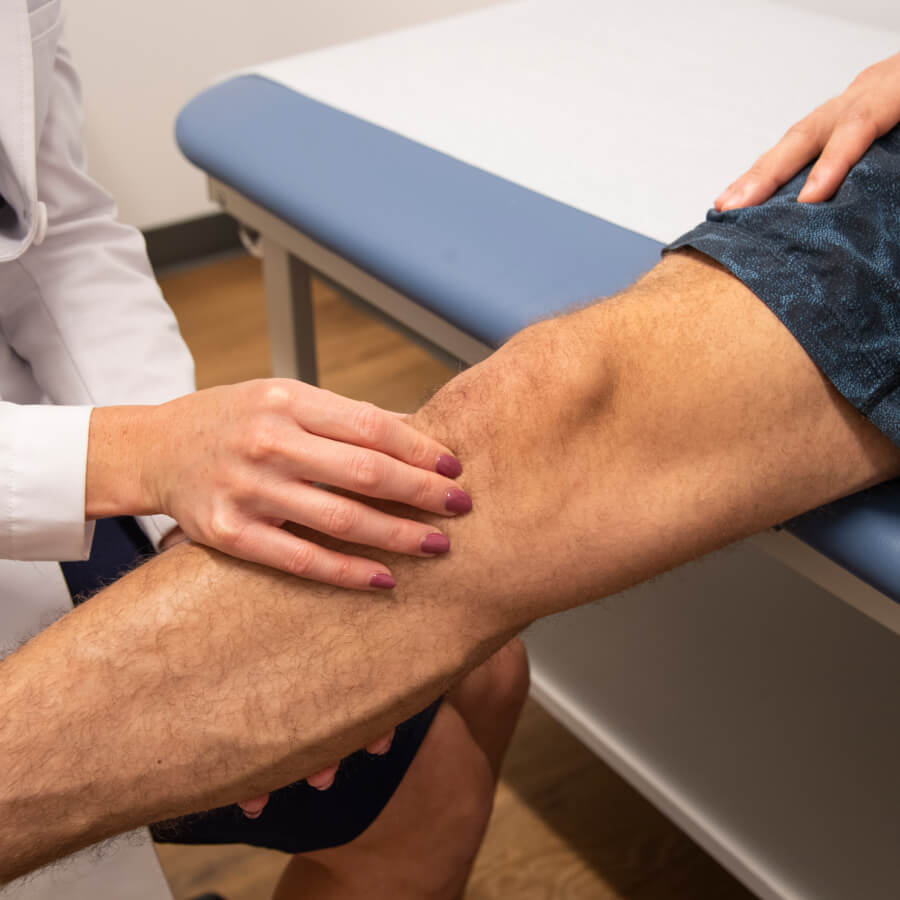Knee Injury Types
Knee injuries are a very common type of injury. This is because the knee is a very mobile part of the body. As such, it’s made up of many moving parts, such as joints, muscles, tendons, and ligaments. All work together to ensure that your knee will work correctly. However, if any part is injured, it will affect the other parts.
This is why all knee injuries, no matter how severe, should be treated quickly and with care. This is especially true for ligament injuries, such as MCL, LCL, and PCL injuries.
Get Advanced Knee Care
Right In Your Neighborhood
Finding the treatment that’s right for your knee problem is our focus at The Orthopedic Health Center. We use non-surgical treatments whenever possible. When you do need surgery, our expert surgeons help you heal faster and with less pain. All right in your neighborhood: Hoboken and Jersey City.
MCL Injury

An MCL injury is what happens when there’s a tear or sprain in the medial collateral ligament (a specific ligament in the knee). More specifically, the MCL is a grouping of tissue on the inside area of your knee that connects the lower leg bone to the thighbone. It is this ligament that stops your knee from bending backward.
Potential Causes
Sports such as skiing, football, and soccer are more likely than others to lead to an MCL injury. This is because they are activities that involve changing direction quickly, twisting, and bending the knee more than usual usage.
Potential Symptoms
If you have an MCL injury, you might have to deal with pain, tenderness, and swelling hours after you receive the injury. There might also be a stiff feeling that prevents you from moving the knee.
Treatment
Depending on the severity of the injury, you might need surgery. However, for less severe injuries, using ice, over-the-counter anti-inflammatory medicine, and resting the knee will help with recovery. Including a brace in your at-home treatment plan can also help. The severity of the injury will also determine how long you will be in pain, and it can range from anywhere from a few weeks to a couple of months.
Always make sure to discuss the injury with a doctor just in case the injury is very severe.
LCL Injury
An LCL injury (which can be an LCL tear or a torn LCL), is an injury that occurs when there’s a tear or a strain in the lateral collateral ligament. This ligament is a grouping of tissue that twines around the outer part of the knee and that serves to hold the bones together to keep the knee stable when walking or performing activities.
Potential Causes
- There are many potential causes for an LCL injury, but some of the main ones include:
- Participating in sports that require pivoting or changing direction quickly, such as basketball, soccer, and hockey.
- Experiencing a direct injury to the knee.
- Landing badly after a jump. The sudden pressure on the ligament and the bad angle can cause it to snap or tear.
Keep in mind that this injury tends to occur more in females than in males.
Potential Symptoms
As with most knee injuries, you might have to deal with swelling and pain, as well as tenderness, bruises, and soreness. Additionally, your knee might suddenly feel unstable, or it may lock up and cause you to lose your balance when walking or going up stairs.
Treatment
Depending on the severity of the injury, you might be able to recover with at-home, over-the-counter remedies. However, if the injury is very severe, you might be recommended physical therapy and/or surgery. Work closely with a medical professional to make sure you are performing the proper activities to secure your best chance at a complete recovery.
A Minimally-Invasive Approach to Knee Repair
A common misconception is that you need a big, open surgery to fix your knee. We use modern, minimally-invasive procedures to avoid this path whenever possible – and many of our patients are up and walking by the next day.
PCL Injury
A PCL injury is an injury that happens to the posterior cruciate ligament in your knee. When discussing knee injuries, this is a rarer one; you are more likely to suffer from an ACL injury than a PCL injury. The PCL is a ligament that works with the ACL to connect your shinbone with your femur.
Potential Causes
The PCL is slightly more difficult to injure than the ACL. However, some common causes are specific contact sports that can result in direct knee injuries, such as soccer or football. Motor vehicle accidents that involve your knee slamming into the dashboard can tear your PCL as well. When dealing with a knee injury, contact a doctor so they can determine the severity and proper treatment regimen.
Potential Symptoms
Experiencing a PCL injury can still cause pain, although it will likely cause less than an ACL tear or other injury. Despite the reduced potential pain, you might still find it difficult to walk, and you might be subject to a temporary limp. Additionally, swelling and bruising in the afflicted area is common, as is feeling as if your knee will give out underneath you. This instability and/or wobbly feeling is common in a PCL injury.
Treatment
As with other knee injuries, the severity of the injury will determine the treatment. You might be recommended over-the-counter medications or a knee brace, and more severe injuries may require physical therapy, pain management, or even orthopedic knee surgery.
Takeaway
If you are suffering from any ligament injuries, getting the injury examined as quickly as possible is the easiest way to increase your risk for a quick recovery. Knee pain and knee injuries are common and our orthopedic specialists have years of experience treating knee conditions. Contact us today!
Additional Resources
Medial Collateral Ligament (MCL) Injury- University of Michigan Health
Lateral Collateral Ligament (LCL) Injury- WebMD
Posterior Cruciate Ligament (PCL) Injury- OrthoInfo
Appointments available now.
